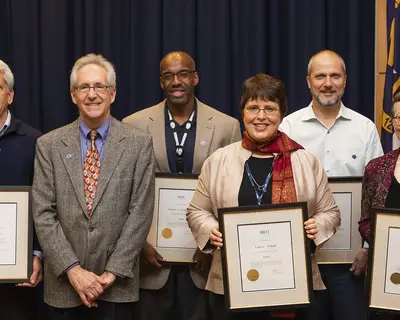RESEARCH TRIANGLE PARK, NC — RTI International, a leading, independent non-profit research institution, has named appointments and promotions for six researchers in its prestigious Fellow Program. New appointments and promotions go to Antonio Morgan-Lopez, Ph.D., and Laura Nyblade, Ph.D., as new RTI Fellows; Bill Zule, Ph.D., promoted to Senior Fellow; Barbara Biesecker, Ph.D., and Alex Kral, Ph.D., newly appointed as Distinguished Fellows; and Jenny Wiley, Ph.D., promoted to Distinguished Fellow.
“These scientific and technical leaders cover a wide range of research areas—from substance abuse and addiction treatment methodologies to HIV and AIDS program and policy advancements to the evaluation of syringe exchange programs and the application of genetics screenings that help to transform complex global health care challenges,” said RTI Distinguished Fellow Don Bailey, Fellow Program applications and promotions committee chair. “The RTI Fellow Program supports great ideas for positive change, and more importantly, invests in the bold and talented people behind them.”
Since its establishment in 2001, the RTI Fellow Program has provided professional opportunities for exceptionally talented RTI staff committed to science, technology research and policy analysis. The program is designed to support RTI's mission to improve the human condition, and includes three levels: Fellow, Senior Fellow and Distinguished Fellow.
Antonio Morgan-Lopez
Morgan-Lopez, a senior research quantitative psychologist and Fellow at RTI, leads studies on the evaluation of substance abuse and youth violence prevention programs. His methodology focuses on advances in measurement and analysis in behavioral drug and alcoholism treatment contexts.
He has published in the areas of experimental design in substance use/abuse prevention and treatment; advances in mediation analysis, substance use, and mental health among ethnic minorities; prevention research training; and advances in modeling non-ignorable missing data. He is a principal investigator on a number of National Institutes of Health (NIH) grants.
Dr. Morgan-Lopez holds both a doctorate in quantitative psychology and a master’s in clinical psychology from Arizona State University. He earned a bachelor’s in psychology from Morgan State University.
Laura Nyblade
Nyblade is an expert on stigma and discrimination in the context of public health. As a senior technical advisor for RTI’s Global Health Division and a Fellow, she leads several initiatives aimed at measuring and reducing stigma, especially surrounding HIV and AIDS.
Dr. Nyblade’s projects have reached patients, health care professionals, and policymakers around the world. She has led a global initiative to develop, test, and standardize a tool for measuring stigma and discrimination among health facility staff. She has supported national AIDS programs in the Caribbean and conducted research on preventing mother-to-child HIV transmission. In South and South-East Asia and sub-Saharan Africa, she has collaborated with governments to promote evidence-based stigma-reduction programs, engage different audiences, and support improved policies.
She earned a doctorate and a master’s in demography from the University of Pennsylvania and a bachelor’s in economics from Pennsylvania State University. Prior to joining RTI in 2011, Dr. Nyblade served as Director of Stigma, Discrimination, and Gender at the International Center for Research on Women. She has an academic background in demography and has provided technical guidance for the U.K. Department for International Development, the Joint United Nations Programme on HIV/AIDS, the U.S. Agency for International Development, and the World Bank.
Bill Zule
Senior Fellow Zule is a leading expert in community-based HIV prevention research. For more than 25 years, his research has focused on HIV and hepatitis C virus epidemiology and prevention.
Dr. Zule’s work suggests that better syringe designs may substantially reduce HIV infections from syringe sharing. He is currently working with two needle and syringe programs in Tajikistan to develop and test strategies for implementing the World Health Organization’s recommendations regarding the distribution of low dead space syringes to reduce hepatitis C virus and HIV transmission among people who inject drugs.
His early work helped clarify the context of indirect needle sharing in HIV risk among intravenous drug users. Dr. Zule has been a principal investigator, project director, and ethnographer on several large HIV prevention epidemiologic research projects. More recently, he has published a series of papers examining and assessing treatment readiness and entry among out-of-treatment drug users. Dr. Zule currently serves on the board of directors of the North Carolina Harm Reduction Association.
He received both a doctorate in community health practice and a Master’s in Public Health from the University of Texas School of Public Health. He earned a bachelor’s in sociology from the University of Texas, San Antonio.
Barbara Biesecker
Biesecker is a senior research public health analyst in RTI’s Center for Newborn Screening, Ethics, and Disability Studies and Distinguished Fellow. She holds a joint appointment in the Center for Communication Science in the Public Health Research division, within the Social Policy, Health, and Economics Research unit.
Her expansive work includes genetic counseling, clinical care, graduate education and research. She has authored or co-authored more than 150 peer-reviewed articles, with major publications addressing psychological, social and health outcomes of living with a genetic condition or at genetic risk, and the translation of genomics into clinical care.
Dr. Biesecker has served as a committee or task force member in more than a dozen professional organizations, serves on the advisory board of the Stanford University Genetic Counseling Graduate Program and on the editorial board of Clinical Genetics, and has been prolific in publishing peer-reviewed papers. She has presented her research findings at numerous national and international conferences.
She earned a doctorate in health psychology from Kings College, London; a master’s in human genetics from the University of Michigan; and bachelor’s degrees in genetics and psychology from St. Olaf College.
Alex Kral
Distinguished Fellow Kral is an infectious disease epidemiologist with expertise in community-based research with urban poor populations. His policy and evaluation research has included syringe exchange programs, overdose education and naloxone distribution programs, and supervised consumption service programs. He is currently the principal investigator and co-investigator on several National Institute on Drug Abuse (NIDA) and Laura and John Arnold Foundation (LJAF) funded studies of the relationship between infectious diseases, criminal justice involvement, substance use, and poverty.
Dr. Kral has authored or co-authored more than 160 articles in peer-reviewed journals, including the Lancet, New England Journal of Medicine, Journal of the American Medical Association, American Journal of Epidemiology, American Journal of Public Health and Drug and Alcohol Dependence.
He holds a doctorate in epidemiology from the School of Public Health at the University of California, Berkeley, and a master’s in epidemiology from the Harvard School of Public Health. He earned a bachelor’s in sociology from Georgetown University.
Jenny Wiley
Distinguished Fellow Wiley is a leading expert in behavioral pharmacology who has worked extensively with various multidisciplinary and multi-institutional teams focused on studies that use a wide range of methods from molecular to behavioral.
Dr. Wiley designs and supervises a program of in vivo research that complements existing strengths of the Center for Discovery and Analytical Sciences, including the synthesis and development of candidate medications and investigation of neural mechanisms underlying substance abuse. She also conducts independent National Institutes of Health grant-supported research in the area of cannabinoid pharmacology, an area in which she has an extensive record of peer-reviewed publications.
Before joining RTI in March 2010, Dr. Wiley was a professor in the Department of Pharmacology and Toxicology at Virginia Commonwealth University (VCU), where she still maintains an affiliate appointment. Additionally, she has been involved in governance of the International Cannabinoid Research Society for many years and served as the Society’s president at the 2013 meeting.
She earned both a doctorate and a master’s in biopsychology from VCU and a bachelor’s in psychology from the College of William and Mary.
“This year’s Fellows will focus on broad issues that affect public health, in the pursuit of their areas of research,” summarized Bailey. “RTI is proud to have such dedicated and talented researchers who will help us to turn knowledge into practice to advance the human condition.”
For more information about the RTI Fellows Program, please visit https://www.rti.org/rti-fellow-program.

- RTI International, a leading, independent non-profit research institution, has named appointments and promotions for six researchers in its prestigious Fellow Program.
- New appointments and promotions go to Antonio Morgan-Lopez, Ph.D., and Laura Nyblade, Ph.D., as new RTI Fellows; Bill Zule, Ph.D., promoted to Senior Fellow; Barbara Biesecker, Ph.D., and Alex Kral, Ph.D., newly appointed as Distinguished Fellows; and Jenny Wiley, Ph.D., promoted to Distinguished Fellow.
- “The RTI Fellow Program supports great ideas for positive change, and more importantly, invests in the bold and talented people behind them,” said Don Bailey, Fellow Program applications and promotions committee chair.
RTI International Media Relations:


